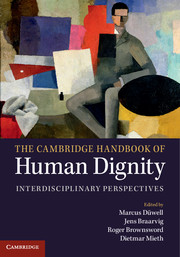Book contents
- Frontmatter
- Contents
- List of contributors
- Foreword
- Why a handbook on human dignity?
- Acknowledgments
- 1 Human dignity from a legal perspective
- 2 Human dignity: concepts, discussions, philosophical perspectives
- Part I Origins of the concept in European history
- Part II Beyond the scope of the European tradition
- Part III Systematic conceptualization
- Part IV Legal implementation
- 36 Equal dignity in international human rights
- 37 Is human dignity a useless concept? Legal perspectives
- 38 Human dignity in French law
- 39 Human dignity in German law
- 40 Human dignity in US law
- 41 Human dignity in South American law
- 42 Human dignity in South African law
- 43 The Islamic world and the alternative declarations of human rights
- 44 The protection of human dignity under Chinese law
- 45 Human dignity in Japanese law
- 46 The place of dignity in the Indian Constitution
- Part V Conflicts and violence
- Part VI Contexts of justice
- Part VII Biology and bioethics
- Appendix 1 Further reading
- Appendix 2 Universal Declaration of Human Rights
- Index
- References
43 - The Islamic world and the alternative declarations of human rights
from Part IV - Legal implementation
Published online by Cambridge University Press: 05 March 2015
- Frontmatter
- Contents
- List of contributors
- Foreword
- Why a handbook on human dignity?
- Acknowledgments
- 1 Human dignity from a legal perspective
- 2 Human dignity: concepts, discussions, philosophical perspectives
- Part I Origins of the concept in European history
- Part II Beyond the scope of the European tradition
- Part III Systematic conceptualization
- Part IV Legal implementation
- 36 Equal dignity in international human rights
- 37 Is human dignity a useless concept? Legal perspectives
- 38 Human dignity in French law
- 39 Human dignity in German law
- 40 Human dignity in US law
- 41 Human dignity in South American law
- 42 Human dignity in South African law
- 43 The Islamic world and the alternative declarations of human rights
- 44 The protection of human dignity under Chinese law
- 45 Human dignity in Japanese law
- 46 The place of dignity in the Indian Constitution
- Part V Conflicts and violence
- Part VI Contexts of justice
- Part VII Biology and bioethics
- Appendix 1 Further reading
- Appendix 2 Universal Declaration of Human Rights
- Index
- References
Summary
Since the appearance of the Universal Declaration of Human Rights, various human rights declarations have been proposed that purport to set forth alternative Islamic principles on human rights. How Islam pertains to human rights remains contested, and none of the proposed Islamic human rights declarations can be taken as a definitive statement of Islamic human rights. The Islamic heritage is diffuse and complex, and trends in contemporary Islamic thought vary widely. Moreover, the rationale for producing Islamic alternatives is challenged by Muslims who embrace the UDHR as consonant with their faith along with the concept of dignity that is linked to the human rights that it sets forth.
The idea that Islam possesses its own distinctive version of human rights has been promoted by conservative forces in Muslim societies that seek to uphold rules of Islamic law, or Shariʿa, that are in conflict with the UDHR. In league with some of these conservative forces, governments of Muslim countries have sponsored alternative declarations and resolutions that rely on Islamic elements to rationalize non-compliance with the UDHR, eliminating some UDHR rights and circumscribing others. Where the concept of dignity figures in such declarations, because it accommodates inequality and restrictions on rights, it takes on colourations unlike those of dignity in the UDHR.
- Type
- Chapter
- Information
- The Cambridge Handbook of Human DignityInterdisciplinary Perspectives, pp. 407 - 413Publisher: Cambridge University PressPrint publication year: 2014
References
- 1
- Cited by



